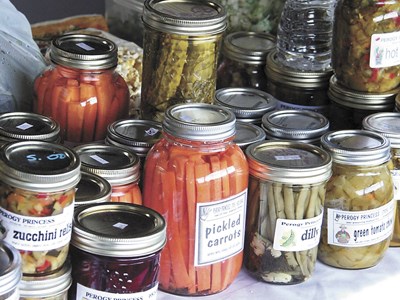Q: Is it possible to find local food when the farmers’ market is closed for the season or during winter months?
A: Definitely!
Although grocery and convenience stores have limited local food in the winter, they often have potatoes, kettle corn, beef jerky or local dairy products.
Bakeries or butchers may also have a local component and you may purchase food through local suppliers (i.e. local food store) or producers (farmgate sales). Some popular items in the winter are ground beef (most local beef is ecologically grown, 100 per cent grass-fed, no hormones or antibiotics) deli meats, cheese, and milk.
Before going to the grocery store, think about which local items you may want to purchase through a local food store.
There is quite a variety: meat (beef, lamb, fish, pork), dairy (butter, milk), a variety of cheeses (blue cheese, curds, mozzarella), grains (flour, oats, bran), vegetables (squash, cabbage and root vegetables, like beets and onions are still available), apples, honey, tea, vinaigrettes/salad dressings, preserves (jams, jellies, pickles), snacks (Ontario-grown flavoured peanuts, kettle corn).
Of course there are a few speciality items such as duck eggs, goat milk and bison meat, as well. Sounds like a full grocery list!
You may also choose to eat local food year-round through preserving your own. Food preservation may include canning, pickling, dehydrating and smoking. Of course, there are many foods you can also simply freeze directly (blueberries and strawberries).
Although many family recipes are passed from generation to generation, food preservation techniques are often forgotten and lost. There are local food preserving workshops within Greater Sudbury where you learn such techniques. By getting your kids involved, you engage them directly in eating a healthier diet and it might even get them interested in home gardening.
Please remember not to attempt food preservation such as canning and dehydrating without proper information. It is an exact science and some techniques have guidelines set out by the Ontario Ministry of Agriculture and Food and the Sudbury and District Health Unit.
One of the consequences of improper food canning is botulism, while other techniques may result in mold growth and spoilage so it is important to ensure proper hygiene and follow tested recipes to the letter.
What goes into our mouths has a huge impact on our health, on our pocket-books, and on the wider economic and environmental systems. Eating local helps our local economy, reduces “food miles,” and provides fresher food for you and your family.
By learning new food skills, you can be more food self-reliant and supportive of local farms and seasonal produce.
Thanks to EarthCare Sudbury Partners Eat Local Sudbury Co-operative and The FoodShed Project for responding to this question.
EarthCare Sudbury is a network of more than 100 local businesses, organizations and agencies that have committed to help Greater Sudbury become greener, cleaner, healthier and more sustainable. Find out more about EarthCare Sudbury, our partners and how to get involved by visiting our website at www.greatersudbury.ca/earthcare.
Do you have a question about an environmental issue? Ask an EarthCare Expert! Submit your question online at greatersudbury.ca/earthcare, then watch for this column published in Northern Life for an “expert” response.
Posted by Vivian Scinto
Join Sudbury.com+
- Messages
- Post a Listing
- Your Listings
- Your Profile
- Your Subscriptions
- Your Likes
- Your Business
- Support Local News
- Payment History
Sudbury.com+ members
Already a +member?
Not a +member?
Sign up for a Sudbury.com+ account for instant access to upcoming contests, local offers, auctions and so much more.
